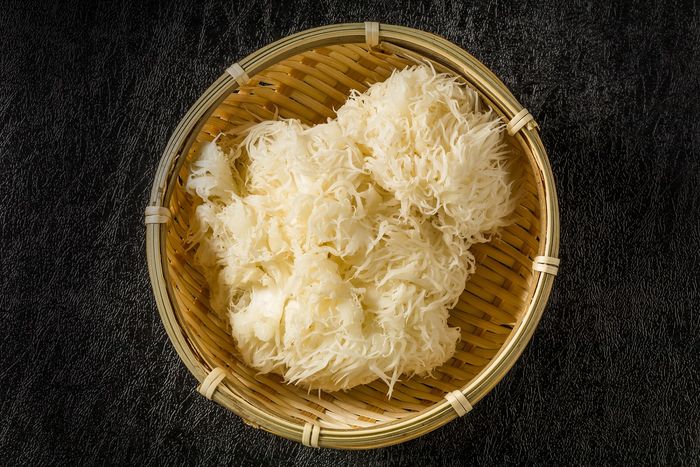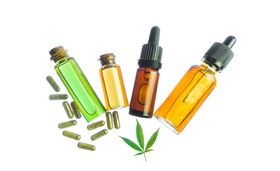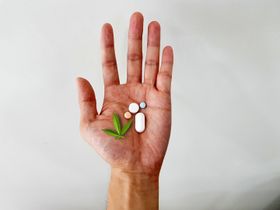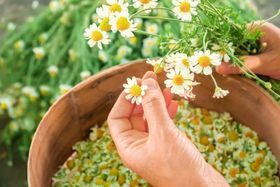How to Eat Lion’s Mane Mushrooms
Updated September 20, 2023.

Native to regions in North America, Asia, and Europe, Lion's Mane mushrooms (Hericium Erinaceus) have been used for thousands of years as a traditional medicine believed to have an incredible variety of therapeutic and pharmaceutical benefits. In fact, they have become so popular in Western medicine that they can now be purchased as dried powders and supplements in pill form or concentrated extracts.
However, you can still purchase the whole mushrooms, both dried and raw, and they can be incorporated into a number of different consumables. And so, as to the question of "can you eat Lion's Mane mushrooms?" the answer is yes, absolutely, and here's how.
How to Consume Dried Lion's Mane Mushrooms
Probably the most popular form of purchasing traditional medicine aside from supplements, dehydrated Lion's Mane mushrooms (whole or powdered) can be incorporated into beverages and other foods. Although you can swallow the dried Lion's Mane mushrooms like you would a supplement, they won't be as tasty as the fresh mushrooms.
But, if you aren't intending on cooking with them, here are some things you can do instead:
Make Lion's Mane Mushroom Tea
- Simmer 2-5 grams (depending on the desired strength) of dried Lion's Mane mushrooms in 2-3 cups of water on the stove for 15-20 minutes until sufficiently steeped.
- Remove mushrooms and dispose of them as you see fit.
- Add 1 or 2 teabags as desired.
- Flavour with spices such as cinnamon, chai, or nutmeg.
- Steep for a further 5-10 minutes.
- Strain and drink hot with honey or lemon (if desired) or iced as a refreshing and healthy summer drink.
» Consume lion's mane without the hassle with our natural drops
Drink Lion's Mane Coffee
Lion's Mane is most commonly sold to the public in dehydrated powder form that has a pretty neutral taste to it. This means that by simply adding a few scoops to your morning coffee, smoothie, or any other beverage, you will reap all the benefits without altering the taste.
» Spice up your coffee with our lion's mane infused drops for relaxation
Can You Cook Lion's Mane Mushrooms?
The short answer to this question is yes. You can definitely cook with Lion's Mane. In fact, you should cook the mushrooms, and here's why:
Some people might assume that cooking Lion's Mane mushrooms could destroy the valuable nutrients and render them useless, similar to how cannabidiol (CBD) reacts under extreme heat, but this isn't true. Cooking the mushrooms breaks down their chitin, the primary constituent of their cell walls. Doing this actually allows your body to get to all the nutrients inside the mushroom that would otherwise be more difficult to absorb, as well as improving the fibrous and woody texture.
Unlike other functional mushrooms, Lion's Mane has quite a pleasant taste (some say it has a seafood-like flavour similar to lobster). This means that they can be used in a variety of recipes, either as a substitute to regular white-button mushrooms or as a hearty addition. If you can find the fresh and raw mushrooms, by all means, do so, but you can also use the dried mushrooms as they will absorb the moisture from your cooking, or add a few scoops of the powder into soups and stews.
How Long Do Lion's Mane Mushrooms Last?
Since they are a fungus, like all other mushrooms, raw and fresh Lion's Mane will typically last about a week, as long as you keep them refrigerated and don't expose them to moisture. Unless you're planning on washing them and then cooking them right after. On the other hand, dried mushrooms could keep up to a year if stored in an air-tight container away from moisture.
Yellow marks on Lion's Mane mushrooms don't indicate that they're bad, as yellow is simply a sign of maturation. While they should be harvested before this stage, as this is when they would typically produce spores, a little yellow on your Lion's mane is nothing to worry about and is still edible.
When the mushrooms have gone bad, they'll be anything from slimy to excessively wrinkly, covered in dark spots, or smell rotten. If you're unsure, best not to eat them.
Is Lion’s Mane Better Cooked or Raw?
As a final thought on this traditional medicine, there really is no "best way to eat them." You'll experience the benefits of Lion's Mane mushrooms no matter what way you choose to consume them. At the end of the day, it comes down to a factor of personal choice and availability.
» Cannabotech combines lion's mane with other fungi and natural remedies









